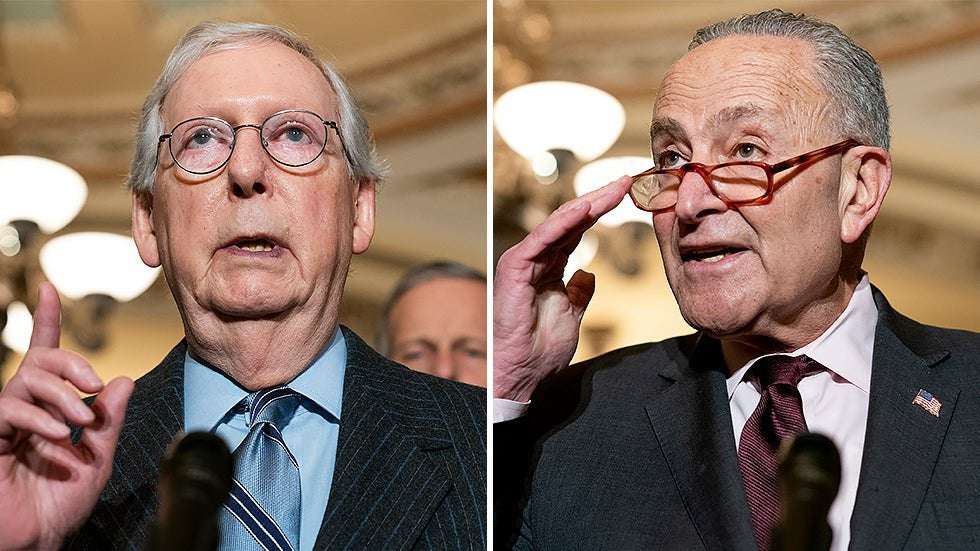Senate Minority Leader Mitch McConnell Addison (Mitch) Mitchell McConnellMcConnell blocks simple majority votes on Dems' voting rights bills Republicans threaten floor takeover if Democrats weaken filibuster Biden to 'forcefully advocate' for voting rights in Tuesday speech MORE (R-Ky.) on Monday night blocked an attempt by Senate Majority Leader Charles Schumer Chuck SchumerClyburn on updating election law: 'What is true today was not true then' Biden eulogizes Reid as a fighter 'for the America we all love' Like it or not, all roads forward for Democrats go through Joe Manchin MORE (D-N.Y.) to set up simple majority votes on a sweeping elections bill and legislation to bolster the 1965 Voting Rights Act, which would have allowed Democrats to pass the two bills without GOP support.
Schumer, on the Senate floor, detailed his offer: allowing the two bills to need only a simple majority to pass instead of needing the normal 60 votes to advance in the Senate. In exchange, Democrats would sign off on holding simple majority votes on nearly 20 bills that Republicans placed on the Senate calendar, which makes them available for a vote but doesn't guarantee they'll get one.
"We Democrats aren't afraid of these votes. So what I proposed to the Republican leader is that the Senate hold up-or-down votes at a majority threshold on each of the Republicans bills he has outlined tonight as well as the Freedom to Vote Act and the John Lewis John LewisMcConnell blocks simple majority votes on Dems' voting rights bills Democrats face moment of truth in filibuster fight Biden to 'forcefully advocate' for voting rights in Tuesday speech MORE Voting Rights Advancement Act," Schumer said from the Senate floor.
McConnell, however, rejected Schumer's offer without elaborating on his objection. Under the Senate's rules, any one senator can try to set up a vote or pass a bill, but because it requires signoff from the full Senate, any one senator can also object and block the request.
Schumer is expected to force votes this week on both the Freedom to Vote Act, which would overhaul federal elections, and separate voting legislation named after the late Rep. John Lewis (D-Ga.) that would strengthen the 1965 Voting Rights Act. But Republicans are set to use the 60-vote legislative filibuster to block those bills from advancing.
Once that happens, Schumer has vowed to bring up changing the legislative filibuster by Jan. 17, bringing to a head months of behind-the-scenes negotiations among Democrats as they've tried to unify on rules changes.
To change the rules, Democrats need total unity from all 50 of their members, something they don't yet have. Sens. Joe Manchin Joe ManchinOn the Money — Democrats grow less confident in Manchin McConnell blocks simple majority votes on Dems' voting rights bills Republicans threaten floor takeover if Democrats weaken filibuster MORE (D-W.Va.) and Kyrsten Sinema Kyrsten SinemaMcConnell blocks simple majority votes on Dems' voting rights bills Republicans threaten floor takeover if Democrats weaken filibuster Democrats face moment of truth in filibuster fight MORE (D-Ariz.) both support a supermajority requirement for legislation, while others, including Sen. Mark KellyMark KellyMcConnell blocks simple majority votes on Dems' voting rights bills Republicans threaten floor takeover if Democrats weaken filibuster Democrats face moment of truth in filibuster fight MORE (D-Ariz.), haven't yet taken a position. Democrats also haven't landed on what proposal would unite the other 48 members of the caucus besides Manchin and Sinema, with some senators supportive of a talking filibuster, while others back a carveout for voting rights.
But even as the Democratic bid to change the rules appears to be a long shot, Republicans are ramping up their pushback against the effort. McConnell and Schumer traded shots on the Senate floor earlier Monday.
And Republicans put their 18 bills on the Senate calendar to showcase the kind of legislation they would try to force to the floor if Democrats got rid of the 60-vote hurdle currently required to start debate on a bill. Even if a bill meets that threshold, opponents can still try to block it with the same requirement needed to end debate and move to a final vote.
“Since Sen. Schumer is hellbent on trying to break the Senate, Republicans will show how this reckless action would have immediate consequences,” McConnell said in a statement first reported by The Wall Street Journal.
The bills that Republicans are making available for a vote include legislation on immigration, fracking, Cuba, President Biden Joe BidenBiden coronavirus vaccine-or-test mandate goes into effect On the Money — Democrats grow less confident in Manchin Fed Vice Chair Clarida to resign over pandemic stock trades MORE's vaccine mandate and limiting funding to school districts that don't have in-person learning amid the coronavirus pandemic. But Schumer's office argued that by forcing Republicans to block votes on their own bills, in exchange for allowing simple majority votes on the Democratic election bills, they were calling McConnell's "bluff."

FartLighter on January 11st, 2022 at 03:03 UTC »
Manchin: "Oh well, that's that."
CobraPony67 on January 11st, 2022 at 02:51 UTC »
McConnell doesn't mind a simple majority when it comes to cramming right wing supreme court justices but for voting rights? No.
swiftawaywithme on January 11st, 2022 at 02:38 UTC »
TLDR: Schumer asks that Dems be able to pass their 2 voting rights bills by simple majority in exchange for the GOP getting up-or-down votes on the bills McConnell earlier threatened to bring up. McConnell rejected the offer.